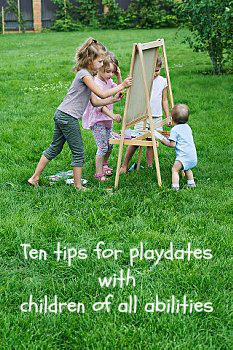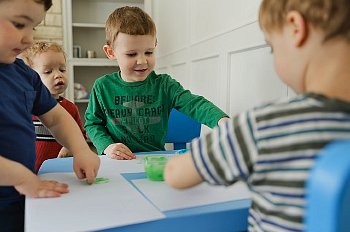
A guest post by By: Cara N. Koscinski MOT, OTR/L
Playdates are beneficial for ALL children to practice critical social skills on which future relationships will be built. The benefits of play dates include increasing confidence; improving social decision making; and practicing skills in an adult supervised yet natural setting. Playing together allows kids to be a part of the action vs. being quiet observers. Play typically develops in a natural progression from individual play to parallel play (when children play next to each other), and finally to interactive/social reciprocal play. Many parents of children who are typically developing and those with special needs set up playdates to encourage the building of critical skills and friendships. The most important lesson learned from playing with a variety of children is that EVERY child is different and special! Throughout life, we meet and interact with people of all shapes, sizes, and abilities and learning from each other can actually enhance our life.
Here are some tried and true tips I recommend for setting up play dates with children who are on the autism spectrum
- Practice playing. It may be hard to believe, but the act of playing doesn’t come naturally to some kids. For example, children with autism often have difficulty with taking turns, having a conversation, and interpreting nonverbal gestures. Practicing and explaining this to your child may help him to feel more comfortable. Together, discuss strategies that can be used to help facilitate play. What is a facial expression? Make different faces and ask your child to guess your emotion.
- How do I find children with common interests? Teachers are amazingly insightful and may provide excellent help to identify the children who tend to play together and enjoy similar interests. Volunteer in your child’s classroom to see who your child is interested in playing with. Additionally, birthday parties are great opportunities to observe those children who may be a good match for a playdate. Clubs and activities allow children with similar interests to enjoy each other’s company. My son showed an early interest in chess. I often arrived early to pick him up from chess club and to determine who showed interest in my son. The same is true for Lego club, music classes, art, or sports.
- Remember that parents of children with special needs are used to answering questions about their children and are often quite comfortable discussing ways to help create successful social interactions. Also, be mindful that many families’ schedules are busy, but a child with special needs may have additional appointments for therapy, medical, and developmental concerns. Be flexible in scheduling and do not be offended if the playdate needs to be re-scheduled.
- Shared interests can make a playdate successful. Identify what the children have in common. Build activities upon mutual interests. So, set up Legos and build Angry Birds or Minecraft structures. If the children like the same movie, set up puzzles, art, baking, or sensory play based on the film. Consider meeting at a location such as a park or a museum. Siblings should not be a part of the playdate to allow for targeted friendship building between the two participants.
- Make a plan and then review it with both children who are participating. At the beginning explain what the playdate will look like: First, we will work on a puzzle, and then a snack, etc…. Many children who have special needs benefit from a visual schedule and knowing exactly what is coming up next. ALL of us enjoy predictability and feel more confident with a specific plan in place. However, be flexible if any difficulties or disagreements arise.
- Consider food allergies and sensitivities. When planning a snack contact the other child’s parent to determine which foods are safe for both children. It can be very meaningful for the other parent and is a critical step to avoiding potential life-threatening reactions to foods. Do not be offended if the children do not eat what is set out for a snack. The kids may just be too excited to eat!

- Be mindful of any physical limitations. For example, many children with sensory issues do not prefer to get messy, dirty or wet but they can be super at doing other things such as building or creating. It’s always a sensitive topic to talk about someone’s weaknesses, instead ask, “What is Billy great at doing?”
- Provide adult supervision and support throughout the playdate. Since children of all abilities have different personalities, disagreements may arise. Consider ways to resolve conflicts such as asking both kids to take five deep breaths or closing their eyes and counting to ten. Make sure to ask the other parent which strategies are used when their child becomes stressed or upset. Preparation is a key ingredient in successful interaction when facilitating a playdate.
- Begin with short playdates of an hour. Keep the first playtimes shorter until the children become more comfortable with each other. Consider having more short yet frequent play times with the same friend since relationships can take time to build. It’s important to end on a good note. So, if the children are in any type of conflict, help to facilitate a peaceful ending.
- There is NO such thing as a perfect playdate! Do not put unnecessary pressure on yourself. Both typically developing kids and children with special needs are learning while practicing play and social skills. When learning a skill, we all make mistakes. Our children benefit from every social interaction opportunity. Pat yourself on the back and enjoy watching new friendships bloom and develop.

Cara Koscinski, MOT, OTR/L
Occupational Therapist, Speaker, and Author of the
Pocket Occupational Therapist Book Series
Pediatric occupational therapist, Cara Koscinski, MOT, OTR/L, author of The Pocket Occupational Therapist Book Series was just 17 years old when she decided on her life long career. After shadowing an occupational therapist (OT) at a high school career day, her mind was made up. “I decided that day that’s what I wanted to do,” said Cara.” In fact, I applied to a university OT program as a junior in high school and never looked back. I never considered any other career.”
Little did she know that her passion, first ignited as a teen, would serve her so well in both her professional and personal life. Cara practiced occupational therapy, primarily serving an adult population, for years. It wasn’t until she had two special needs kids of her own that she made the switch to pediatric OT. Cara’s two sons are both on the autism spectrum and have sensory processing disorder. Her younger son has mitochondrial disease, a severe case of Eosinophilic Esophagitis and uses a feeding tube for nourishment. At times, he requires a wheelchair to get around.
Cara believes her experience as a special needs mom gives her unique empathy for her clients and their families. “When I give my clients a home activity, I have personally tried it and know it works,” said Cara. “It’s not easy at all raising two kids with special needs, but I feel very blessed to have the chance to use my professional expertise to help my own boys.”
In addition to her longstanding work as a private practice OT, Cara is a successful entrepreneur, having started her own company, Route2Greatness in 2005. Route2Greatness provides OT consultations, training, and seminars. The company also creates, produces and distributes CDs to help sound sensitivity related to sensory processing disorder. These CDs, called Sound-Eaze and School-Eaze are available on her website or at http://www.pocketot.com or through special needs product retailers.
Cara’s latest venture is The Pocket Occupational Therapist Book Series. As the author of this two-book series, Cara brings her expertise as a pediatric occupational therapist and mother of two special needs children to parents, caregivers, families, and educators in an easy-to-read, easy-to-follow format.
The first book in the series, The Pocket Occupational Therapist for Families of Children with Special Needs, is an accessible overview, which explores how occupational therapy can help a special needs child succeed in the home and community. Written in an easy-to-follow, Q&A format, The Pocket Occupational Therapist for Families of Children with Special Needs discusses some of the most common issues parents confront, including core muscle strength feeding, fine motor skills, sensory sensitivities, transitions, and life skills. The book also offers simple recommended activities to practice at home using commonly-found household items.
In the second book in the series, The Special Needs School Survival Guide: Handbook for Autism, Sensory Processing Disorder, ADHD, Learning Disabilities and More, Cara focuses on how occupational therapy techniques, strategies, and activities can help children with special needs be successful in an educational setting. Written for parents, caregivers, educators, and homeschoolers, The Special Needs School Survival Guide provides answers to the most commonly asked educational questions and challenges, including Autism, Sensory Processing Disorder (SPD), Learning disabilities, ADHD, Individual Education Plans (IEP), 504 plans, Behavior, and Dysgraphia. Like its companion book The Pocket Occupational Therapist, The Special Needs School Survival Guide, it is written in an easy-to-understand and easy-to-read, Q&A format.
Both books are available at The Pocket Occupational Therapist website at http://www.pocketot.com and at amazon.com
If you enjoyed this post you might also like:
Banking With Autism And CIBC – All about an excellent, free life skills app.
Don’t Call Me An Autism Parent – A personal rant I hope you’ll identify with!
Miles before home: Psychology, Fear and Autism – a guest post








I am so impressed! I love working with kids and love to know how I can get involved.
I like the part where you mentioned having Shared interests, so true that it can make a playdate successful. Great to involve something everyone loves and can share together.
These are great suggestions! Be sure to be aware of food allergies is important.
Thank you for this great ideas! Some of us just lack the imagination… 🙂
We home school our kids, and play dates have come up a few times. Most of the Social things they get to do in our area since home schooling is a large part in our community, we group together and do special activities together, we have a monthly news letter that we all receive, so it makes it possible to attend the activities, such as swimming, and rollerskating. Also our church has things going on all month long so that really helps too. I do see where there is a lot of valid information that has been included here. And I am sure it answers many questions. Thanks so much for bring this to everyones attention..
I love these tips, we’re like the neighborhood place to go lol, Our kids bring home their friends for playdates and I enjoy it too you get to know the child, but there are so many of them that come and play. I would love that they have a great & positive time with these tips. Thank you for sharing.
I am so glad you included children of all abilities in this. So encouraging.
I really enjoy posts that speak of inclusivity like this. With kids with differing abilities in our children’s classroom, it is highly possible that playdates/parties etc may happen where a little increased sensitivity is needed. Thanks for the tips!
Practice playing, sounds odd if you don’t understand. I had to sort of ‘work on’ playing with my stepson. he was very shy. Not anymore though!
We have 5 kids and the horror stories I could tell about playdates…….!
This is a great post! I know some folks who would find this resourceful! I’ve watch a lot of kids over the years and some of your points are so true!
“There is NO such thing as a perfect playdate!” ….couldn’t agree more with that statement.